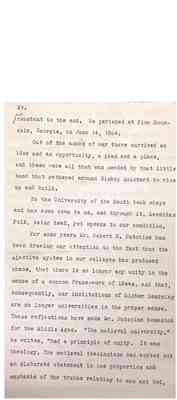Pages That Mention Bishop Quintard
Polk Family Papers Box 1 Document
5
-4-
famous men the University of the South rightly holds first claim. But Sewanee's title must not be allowed to be exclusive. These men belong also the the Protestant Episcopal Church; they belong to the Anglican Communion; they belong to the One, Holy, Catholic and Apostolic Church of the ages. And at the head of their line we rejoice to recognize that grand triumvirate of Bishops and Fathers in God -- James Hervey Otey of Tennessee, Stephen Elliott of Georgia, and, in their center, Leonidas Polk, Missionary Bishop of Arkansas and the Southwest, first Foreign Missionary Bishop of the Protestant Episcopal Church, first Bishop of Louisiana, and, in the words of Bishop Quintard, "the projector, originator, and real founder of the University of the South."
The life of Leonidas Polk was impressed from the beginning with a military character. Both his father and his grandfather had been soldiers of the Revolution. Born on April 10, 1806, in Raleigh, North Carolina, he received
30
-29-
constant to the end. He perished at Pine Mountain, Georgia, on June 14, 1864.
Out of the ashes of war there survived an idea and an opportunity, a plan and a place, and these were all that was needed by that little band that gathered around Bishop Quintard to rise up and build.
So the University of the South took shape and has come down to us, and through it, Leonidas Polk, being dead, yet speaks to our condition.
For some years Mr. Robert M. Hutchins has been drawing our attention to the fact that the elective system in our colleges has produced chaos, that there is no longer any unity in the sense of a common frame-work of ideas, and that, consequently, our institutions of higher learning are no longer universities in the proper sense. These reflections have made Mr. Hutchins homesick for the Middle Ages. "The medieval university," he writes, "had a principle of unity. It was theology. The medievel theologians had worked out an elaborate statement in due proporation and emphasis of the truths relating to man and God,

